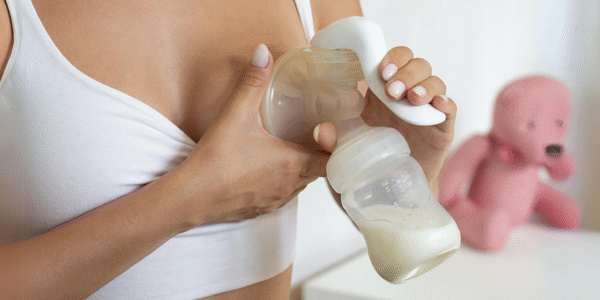Exclusively pumping breast milk can be a great option for new parents who want to provide their baby with the benefits of breast milk but can’t nurse directly for health or lifestyle reasons, or prefer more control over their milk supply.
If you’re considering exclusively pumping breast milk, here’s what you need to know about it and some tips for pumping successfully.
What is Exclusively Pumping Breast Milk?
Exclusively pumping involves using a breast pump to express all the breast milk your little one needs and then feeding it to your baby. Rather than breastfeeding directly, when exclusively pumping, you'll need to pump regularly to maintain your milk supply and provide enough milk for your little one's needs.
Download Your FREE Pumping Tracker HereWhy Might You Choose to Exclusively Pump?
There are many reasons why a new mum might choose to exclusively pump, including:
- Difficulty with breastfeeding: Some mums experience physical challenges that make it difficult to breastfeed, such as sore or cracked nipples, a baby with a weak latch, or an overactive letdown. These can make breastfeeding incredibly painful and leave them unable to continue breastfeeding.
- Separation from baby: If you're returning to work or need to be away from your baby for an extended period, exclusively pumping can allow you to continue providing breast milk even when you're not physically present. Logistical issues are a huge roadblock for many busy mums breastfeeding, and exclusively pumping can be a great solution.
- Personal preference: Some mothers simply prefer pumping to breastfeeding, as it allows for more flexibility and control over their schedule. It also allows the dad or other family members to be more involved with the feeding schedule and help out with those night feeds!
How Often Do You Need to Pump Breast Milk?
To maintain your milk supply, it's important to pump frequently. Ideally, try to pump every 2-3 hours during the day and at least once during the night. In the early weeks, developing a regular pumping routine is particularly important to build up your milk supply and ensure your baby is getting enough milk.
Here are a few tips for mothers who want to exclusively pump:
Invest in a high-quality breast pump
A hospital-grade breast pump is the best option for exclusive pumping, as it can effectively stimulate milk production and express milk quickly. If you can’t get a hospital-grade pump due to cost or other issues, keep an eye out for a good quality double electric pump that allows you to pump both breasts simultaneously. You’ll thank yourself later for the hours of time you save!
Establish a pumping schedule
To maintain a good milk supply, it’s important to pump regularly and consistently. As well as pumping every few hours throughout the day, it’s also a good idea to pump for 15-20 minutes per session, as this will help ensure that you’re emptying your breasts fully each time.
Practise good hygiene
It’s really important to keep your breast pump and supplies clean to avoid the risk of infection. Wash your hands thoroughly before pumping and clean your breast pump and bottles after each use according to the manufacturer’s instructions.
Stay hydrated and well-nourished
Drinking plenty of water can help ensure that you produce enough milk and that your milk is of good quality. Aim to drink at least 8 cups of water and eat a variety of nutrient-dense foods throughout the day to make sure your breast milk is the good stuff!
Take care of yourself
Exclusively pumping can be physically and emotionally demanding, so prioritising self-care is key. Try to get enough rest, exercise regularly, and take breaks when you need them. Remember that it’s okay to ask for help if you need it, and that taking care of yourself is an important part of taking care of your baby.
How Do You Store and Use Pumped Milk?
Breast milk can be safely stored in the fridge or freezer for later use. Freshly pumped milk can be stored in the fridge for up to 4 days, while frozen milk can be stored for up to 6 months. Make sure you date any milk put in the freezer to keep up with stock rotation! When using stored milk, be sure to thaw it in the fridge or in a bowl of warm water (never in the microwave), and use it within 24 hours.
Exclusively pumping can be a challenging but rewarding way to provide breast milk for your baby. By establishing a regular pumping routine and taking care to store and use your milk properly, you can ensure your baby gets the benefits of breast milk, even when you aren’t breastfeeding directly!





